Don't miss any stories → Follow Tennis View
FollowExclusive Interview: The Blacklist’s Ryan Eggold
Ryan Eggold is best known for his role as Tom Keen on NBC’s The Blacklist, but audiences may also remember him from the 90 210 reboot or the 2007 Courteney Cox show, Dirt. Eggold, 33, made his directorial feature film debut at this year’s Tribeca Film Festival with Literally, Right Before Aaron, now available on Amazon, iTunes, and Video on Demand. But the Southern California native didn’t just direct this film: he also wrote, edited, produced, and composed music for it, and assembled what he calls “the greatest cast in the history of movies.” The result is a rich stew of human emotions, a bouillabaisse of poignant, cringe-inducing, charming, and laugh-out-loud funny moments.
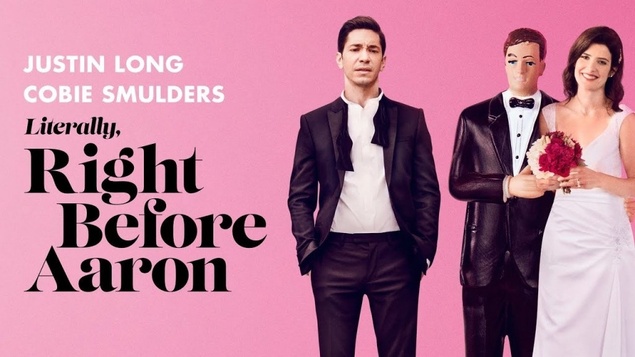
Literally, Right Before Aaron (henceforth L,RBA) stars Justin Long, of Apple commercial and Die Hard 4 fame, as Adam, and How I Met Your Mother’s Cobie Smulders as his ex, Allison; the film’s dynamite supporting cast includes Ryan Hansen, John Cho, Kristen Schaal, Lea Thompson, Peter Gallagher, Luis Guzman, and Dana Delaney. Shot over 22 days in Los Angeles and San Francisco, L,RBA tells the story of a guy whose life has stalled out and he doesn’t even realize it until an invitation to his ex-girlfriend’s wedding causes him to confront reality. The movie’s title comes from the fact that Adam is the guy Allison dated (literally) right before Aaron, her fiancé.
Our protagonist, Adam, is not a great guy – or, more charitably put, he makes a lot of not-so-great decisions throughout the film. He’s stuck in a job that makes him unhappy and haunted by romanticized visions of his failed relationship. He has vague notions of being a documentary filmmaker, but his plans don’t stand up even to polite questioning because he hasn’t really fleshed out what he thinks his perfect life would be. In a flashback to their meet-cute(ish), Allison tells Adam, “I can’t tell if you’re charming or if you’re just an asshole.” That question lingers.
Still, thanks to the deft hands of writer/director Eggold and Long’s boyish charm, the audience is able to root for Adam – to a point. Just like that volatile tennis player you always root for even though he sometimes acts like a jerk on the court, Adam is a character that you want to land on his feet even while you wish you could shake him by his shoulders and tell him to do better, to be better. If you’ve ever found yourself thinking “Please stop screaming at the chair umpire and also I hope you win the U. S. Open,” you’re ready to ride along with Adam’s journey in this movie.
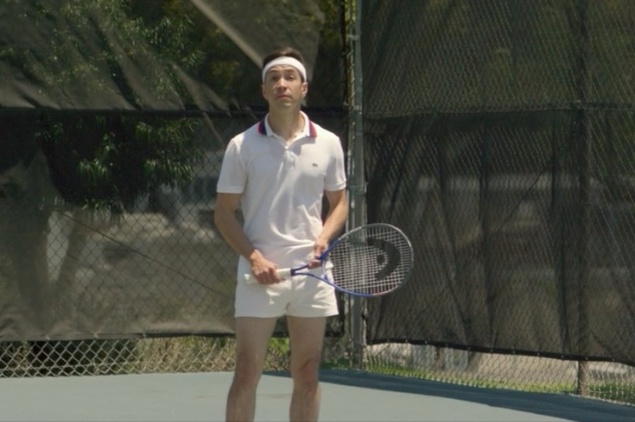
Eggold falls into the category of celebrity tennis fan, and he has fond memories of playing tennis with his sister growing up. He downplays his skills on the court, but once described the experience of working with the talented James Spader as being “like playing tennis with somebody who is great at playing tennis. You have to keep your game up and hit the ball hard.” So it’s no surprise that he chose to set a pivotal scene in L,RBA on the tennis court. “Tennis is such a one-on-one sport with an energy and a directness between the two players that you don’t get in a lot of sports,” Eggold told Tennis View. The showdown between Adam, who is terrible at tennis but doesn’t want to admit it, and Aaron, who almost went pro, switches effortlessly between awkward and hilarious.
L,RBA is a movie about a man who’s stuck in place, and the point of this journey isn’t to see him get what he wants (the girl), but rather what he needs (self-awareness). The film asks tough questions about whether we’re really engaged in our own lives. Are we sabotaging our own happiness? Can our lives have meaning if we don’t have the perfect job, or the perfect relationship? Are we fixated on something unattainable because we think it would make all the other pieces of our lives fall into place?
Read on for the conversation between Ryan Eggold and Tennis View’s Tracey DeFrancesco to find out why Eggold loves Roger Federer, what movie magic goes into filming a tennis scene, and why he thinks most people can identify with an anti-hero – plus a bonus sneak peek at what’s in store for his character, Tom Keen, on The Blacklist this season.
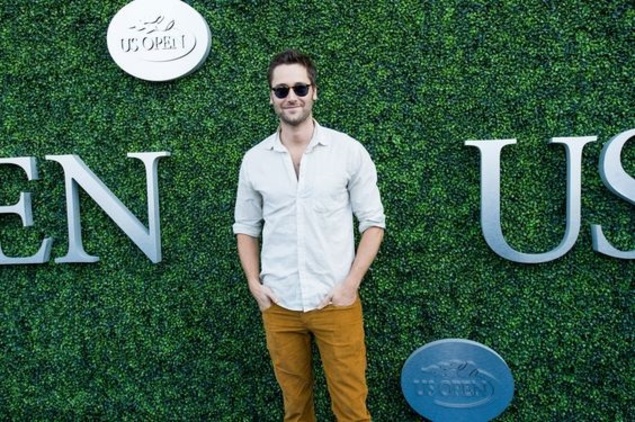
Tennis View: How big of a tennis fan are you?
Ryan Eggold: “I’m definitely a fan of tennis, I went to the U. S. Open this year and the year before, and I enjoyed it even more than I thought I would. I’ve always been a fan, but I’d never been live and it’s really engaging. Federer is my favorite because he’s so graceful, he’s such a gentleman on the court. I got to see Federer and Nadal back-to-back, Nadal first then Federer after. Nadal is so aggressive and animalistic the way he smashes the ball, and Federer really doesn’t try to beat his opponents, he lets his opponents beat themselves, and he just plays well, waiting for them to make a mistake – at least that was my experience in the match I saw this year. I thought that was really cool.”
TV: Why did you choose tennis as the context for the showdown between Adam and Aaron?
RE: “With regard to the film, it was just a great metaphor and playing field for these guys to be sort of combatting each other and releasing some of their aggression into the ball. The fact that one of them is a talented and graceful player, while the other is just a bumbling fool trying as hard as he possibly can, it’s a great character device. I like that underdog quality, that this guy who’s great at tennis is marrying Adam’s ex-girlfriend, and Adam doesn’t know how to play but he’s swinging for the fences. He’s all heart and no skill.”
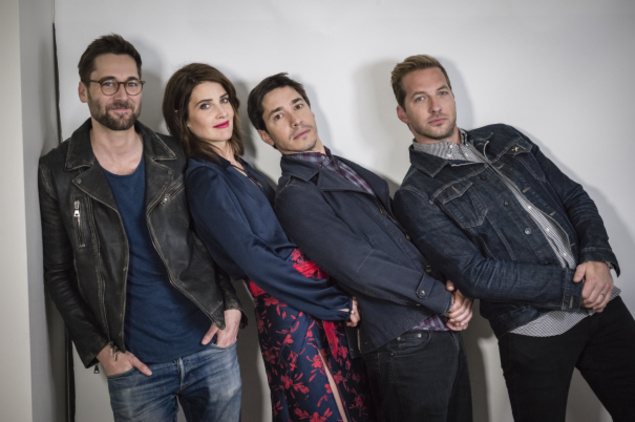
TV: Ryan Hansen (who plays Aaron) seems like he has a decent game, but is Justin Long as bad at tennis as his character?
RE: “I’ll be honest, and I hope that Ryan doesn’t mind me saying so, but it was actually kind of reversed. Justin was a little bit stronger of a player than Ryan was, and we had to cut the footage so it looked like Ryan could play really well and Justin couldn’t play at all. Really what you need for the scenes is the attitude and the mood and the movement. As long as it appears that Ryan’s competent, then we’re good.”
TV: You took on so many roles in making this film, which is based on your 2011 short of the same name. Why did you want to tell this story and what makes it so personal for you?
RE: “This story just kind of came out. I never sat down and made a conscious decision to tell this story. I was going through a break up many years ago and I had the idea for this character who was just stuck in this place, and I was thinking about marriage and relationships, and about what a tragic and comedic predicament it would be. I wrote a scene and more pages came out and almost within that day wrote the short, it just kind of popped out. And then we shot it, and I had a blast directing. I was really inspired to see people laughing, because I had never experienced making something in the theater that people laughed at. Also just the fact that you can feel something in your own life and write this thing alone in your room and then put it on the screen and have strangers you’ve never met say, ‘I’ve felt that, I’ve experienced that,’ is a really cool thing. So because of people coming up to me and sharing their personal stories, I thought, why don’t we make the feature.”
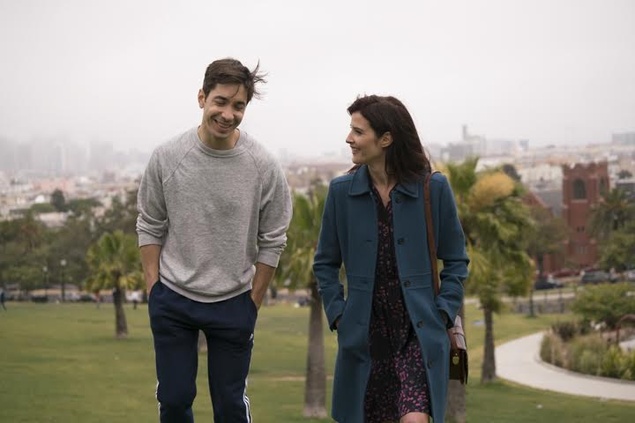
TV: It’s interesting that the audience connects so much with Adam’s story since Adam has such a hard time connecting with people around him.
RE: “That’s a good point, I think a lot of us feel that way in our lives, whether it’s true or not – we all find it hard to connect. Obviously, some people are better at it than others, but I think the point is that we all feel that way, we can all feel that difficulty.”
TV: There’s so many nods to The Graduate in this film, like that great shot through Peter Gallagher’s leg, and the bus at the end; why did you decide to pepper these Easter eggs throughout the film?
RE: “It’s funny, the end was something that came later. The script that we were shooting continued from the place where it ends now, and he kept going on his journey, but where we decided to end it was sort of very Graduate-esque. Once that was there, we kind of leaned into it. That movie is a seminal film for anybody looking to do this, whether they want to be an actor or a writer or a director or an editor. It’s just one of those magical films that everyone can relate to because everyone’s been at that point in their life, of being stuck and sort of overwhelmed and trying to figure out which way to go. Mike Nichols is great and his humor is so understated – like when Dustin Hoffman just walks out in the scuba gear, there’s not a lot of commentary on it, and I love that kind of stuff.”
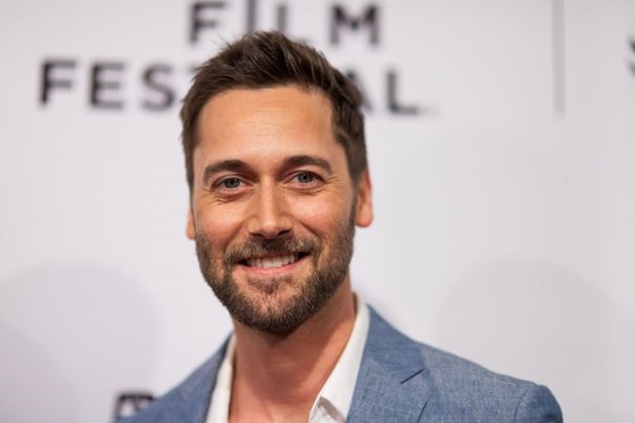
TV: Part of the success of the film is in getting the audience to go along with Adam and root for him even when he’s doing bad things. How did you write and direct such a delicate balance with that character?
RE: “A lot of it has to do with Justin and his inherent charm and likeability that he brings to it, and all the fantastic choices he made as an actor. We were sometimes concerned about that, ‘Is this too unlikeable? Do we lose the audience here?’ My feeling was that it’s so rare that you can make the right decision in life, especially if you’re learning and especially when you’re changing, which the movie should be about. Movies are about times of change, and when that’s happening, you make the wrong decisions that lead to learning and figuring it out. There’s a comedic pay off there, but I also think that ideally, we can forgive him because it’s coming from this human place of feeling hurt and wanting this relationship to work out. I was also inspired by anti-heroes like Max in Wes Anderson’s Rushmore, who is so offensive at times, says the wrong thing, does the wrong thing, and is still endearing for a number of reasons. Or even Dustin Hoffman’s character in The Graduate, who doesn’t make the right decisions until the end. I just think those characters are so much more lifelike.”
TV: You’ve described the movie as an anti-romantic comedy. What themes in the film are most important to you?
RE: “For me, it’s about growing up, coming-of-age. When we’re younger, we have a more idealized view of love and relationships that are informed by movies, television, books, poems, love songs, but the pragmatic reality of relationships that we all experience in our lives is very different. That’s not to say that true love doesn’t exist and you can’t experience wonderful romance, but it’s often very different. I wanted to get at that disparity between this lofty dream of what love is supposed to be, what Adam is clinging to, and reality. He kind of grows up and discovers that there’s this enormous world out there, he gets a new understanding of himself. It’s not like he’s a completely different person overnight, but maybe in that last frame of the film there’s hope that he’s made some discovery about himself or about life and that his world got a little bit bigger in that moment.”
Bonus Question: What are you most excited about for your character on The Blacklist this season?
RE: “I’m excited that he’s finally in this place where he’s going to find the truth no matter what, and he’s pursuing it doggedly. He has an idealized view of what can work out for Tom and Liz, he has this dream of them having a quiet life in a beach house and everything’s perfect, getting away from this dangerous, tumultuous world that they’re in with Reddington [played by James Spader]. He’s pursuing the truth that Red is hiding, and determined to uncover it despite the cost, with the hopes of releasing Liz from this mystery that has enveloped her from day one.”










